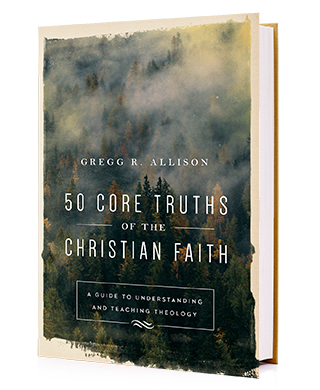50 Core Truths of the Christian Faith: A Guide to Understanding and Teaching Theology by Gregg R. Allison
If you have ever taught Bible or theology to kids or teenagers as a recently enrolled seminary student, you know that it can be difficult to distill all of the complex and nuanced information from your seminary courses. In fact, using the material from your Systematic Theology III class or a whole chapter of Wayne Grudem’s Systematic Theology is probably a great way to confuse or (worse) bore your students.
 Gregg R. Allison understands this problem and seeks to address it in his recent book, 50 Core Truths of the Christian Faith, which was released in February 2018. Doctrine is not just for theology students or pastors — it should be available for all Christians regardless of educational level or discretionary time. Not everyone has a Master of Divinity degree or a minor in Bible, nor does everyone have three hours a week to pore over hundreds of pages of theology. Thus, Allison’s book.
Gregg R. Allison understands this problem and seeks to address it in his recent book, 50 Core Truths of the Christian Faith, which was released in February 2018. Doctrine is not just for theology students or pastors — it should be available for all Christians regardless of educational level or discretionary time. Not everyone has a Master of Divinity degree or a minor in Bible, nor does everyone have three hours a week to pore over hundreds of pages of theology. Thus, Allison’s book.
“The book is unique in its approach to Christian theology,” Allison writes in the introduction. “Though Christian education books explain the theology, methodology, and techniques of teaching, and though Sunday School curricula provide the actual material for teaching, 50 Core Truths of the Christian Faith is unique in that it provides guidance for how to teach each Christian doctrine. As far as I know, no book like it exists.”
The text unpacks fifty major doctrines that are essential to the Christian faith like the inspiration of Scripture, the Trinity, the person of Christ, and the doctrine of election. The book is based on the Teach the Text commentary series, which is also produced by Baker Publishing Group. The goal is to make theology accessible for everyone and to provide the tools for pastors and instructors to teach the Bible to others.
The structure of each chapter is consistent throughout the book. Allison takes major theological concepts that have been discussed and debated for 2,000 years of church history and cuts them down to 2,000-word chapters. The resulting lesson is quick, simple, and easy to read. Each chapter describes how to understand the doctrine, enact the doctrine, and teach the doctrine.
“Christian doctrine is Christian belief based on Scripture,” Allison writes. “The church bears the primary responsibility for constructing and transmitting good theology, with an essential assist from the theological wisdom of the ages. This sound doctrine is believed, practiced, confessed, and taught.”
Allison also includes a series of perennial issues and problems, which are based on questions Allison has personally received after teaching theology for a quarter century, such as: “How is it that Christians don’t believe in three gods if they believe in the Trinity?” or “If God is independent and self-sufficient, why did he create us?” Allison answers some of the questions in his text, others (like “Can people in heaven see us and help us?”) he encourages teachers to think through for themselves. The understanding section includes a list of affirmations and errors, and each chapter ends with a sample outline the reader can apply to an hour of teaching at a Sunday School, high school class, or small group Bible study.
“The format of this book arises from my conviction that doctrine is both true belief and true practice, and that it is confessed by the church and taught from generation to generation,” he writes. “My prayer is that this theological resource will help to form believers in sound doctrine and transform their lives for the glory of God.”





